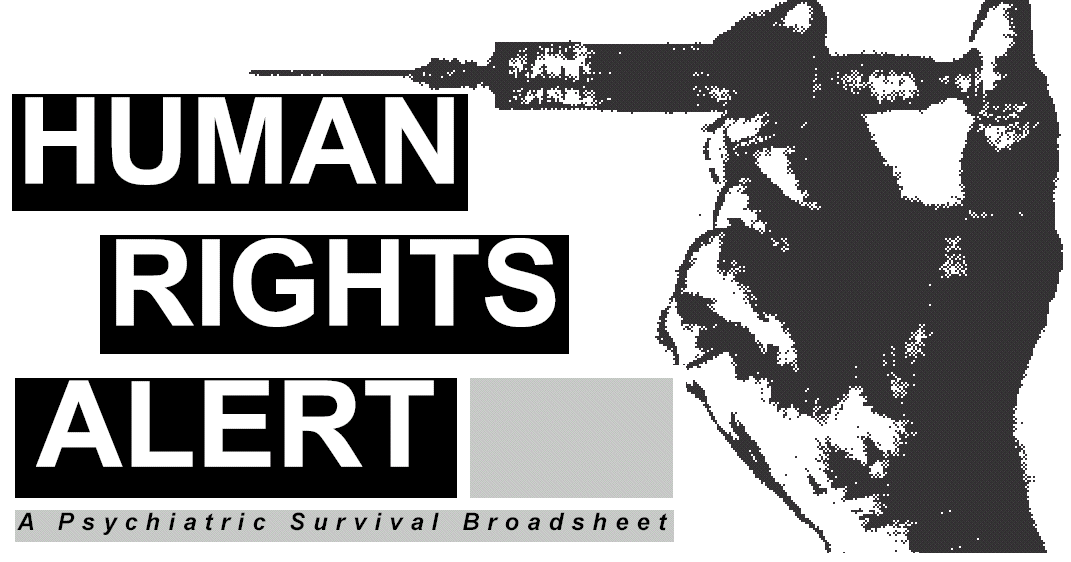

|
|
|
Victory in California! Had it been passed, this legislation would have doubled the periods for which a person could be incarcerated at each stage of the civil commitment process. It also would have made the criteria for commitment so loose that potentially anyone could qualify, and would have made it virtually impossible to win release from a psychiatric facility without first ‘consenting’ to a closely monitored regime of ongoing community ‘treatment.’ This represented the second failed attempt by Assembly member (and former psychiatric nurse) Helen Thomson to introduce restrictive legislation targeting persons with a psychiatric diagnosis. She introduced a similar bill in January 2000 but subsequently withdrew it due to evidence of lack of sufficient support in the Assembly to ensure its passage. At one stage in the proceedings, NAMI members rallying in support of this repressive law found themselves surrounded by Survivors and others opposing this bill. As it turned out, this time the Survivors’ message wound up carrying the day in the media. In addition to AB-1800 going down to defeat, legislation was approved which allocates substantial funding to more ‘user-friendly’ community-based resources in California. Other states that have said ‘NO!’ to IOC/CTO legislation are Iowa, where legislation was introduced but subsequently failed to pass (this fight is far from over as apparently even stronger legislation is now in the works), and Connecticut, which thus far has refused to consider statutes of this kind. The State of Vermont passed an outpatient committal bill in July last year but a subsequent court ruling upheld an earlier statute that will severely restrict its application. At this point in time thirty-seven U.S. states and four Canadian provinces (B.C, Saskatchewan, Manitoba and Ontario) have laws on the books that allow for coerced outpatient ‘treatment’ (‘Brian’s Law’ is to be proclaimed in Ontario on December 1). The Canadian province of New Brunswick has joined with Connecticut in refusing to consider introducing such legislation at this time.
EDUCATION Survivors offer courses through ‘free U. of T.’ In the summer of 1999, a group of students and faculty
members at the University of Toronto along with community members who were
appalled at soaring tuition rates, lack of relevant content and the rapid
corporatization of post-secondary institutions began exploring the concept
of a ‘free university’, where people could offer courses of their own design
in order to freely share knowledge in a non-hierarchical setting.
Mad Peoples History Thursdays, 6 - 8pm Oct 5 – Nov 23, 2000 Geoffrey Reaume, <geoffrey.reaume@utoronto.ca> An overview of the history of madness from ancient times to the present from the point of view of those considered mentally disturbed. This course will examine accounts by mad people from a variety of sources. There will also be references to depictions of madness in the arts and popular culture as well as how gender, race, class and disability influence experiences of mental disorder. The purpose of this course is to ask the question: how has madness been viewed by mad people over the centuries? Week 1. Folly and Fools: Madness in the Ancient and Medieval
Worlds
Anti-psychiatry – Survivor Perspectives Mondays, 7 – 9pm September 25 – December 18 Don Weitz, <dweitz@interlog.com> (416) 760-2795 This is a 14-week course on antipsychiatry from the perspectives of psychiatric survivors offered by the Free University of Toronto. The course is expanded from the 8-week course first held last Spring. Classes will be held every Monday evening,7-9pm (location to be announced). This unique course seeks to educate and empower psychiatric survivors and other marginalized people about the psychiatric survivor liberation movement - its history, major issues, struggles, victories and challenges. The course also provides important information about the psychiatric system and survivor-run alternatives in Canada and the United States. The course also features guest speakers, community activists and panelists who are psychiatric survivors, as well as film and video presentations. Open and free to psychiatric survivors Course consultants: Bonnie Burstow, Ph.D and Geoffrey Reaume, Ph.D Week 1: Sept.25 - INTRODUCTION & IDEOLOGY
Resources in Toronto People Against Coercive Treatment
|